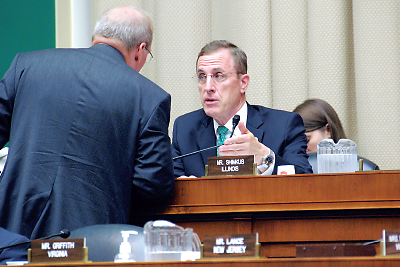House Health Subcommittee Opens Discussion on Mental Health Bill
Abstract
Comprehensive legislation would establish the position of assistant secretary for mental health and substance use disorders within HHS and expand the mental health workforce.
The House Energy and Commerce Subcommittee on Health in June reviewed legislation to fundamentally reform the federal role in the U.S. mental health system.

Rep. Tim Murphy (R-Pa.) is working with fellow members of Congress to shepherd the Helping Families in Mental Health Crisis Act through the legislative process. Murphy and Eddie Bernice Johnson (D-Texas) are cosponsors of the bill.
The bill, HR 2646 (Helping Families in Mental Health Crisis Act), is cosponsored by U.S. Reps. Tim Murphy (R-Pa.) and Eddie Bernice Johnson (D-Texas) and builds on previous legislation put forward by both representatives.
“Severe mental illness is a brain disorder, and it has to be seen and treated for what it is,” said Rep. Joe Pitts (R-Pa.), subcommittee chair. “This bill is comprehensive and is a big first step and makes substantial changes.”
At its core, the bill creates the position of assistant secretary for mental health and substance use disorders, who must be a psychiatrist or Ph.D. clinical psychologist, within the Department of Health and Human Services (HHS). The post would elevate the importance of mental health within the agency, coordinate mental health and related programs across other federal agencies, promote effective evidence-based programs, and ensure compliance with the mental health parity law. The office would also incorporate “all personnel, assets, and obligations” of the Substance Abuse and Mental Health Services Administration (SAMHSA).
The new assistant secretary would have additional powers to develop a national strategy focusing on expanding the clinical psychiatric workforce, further developing integrated care and crisis intervention, and supporting mental health research.
During the hearing, the subcommittee heard from several witnesses, including Paul Gionfriddo, president and CEO of Mental Health America, who called for increased mental health screening and greater emphasis on early interventions to lessen the burden on clinical services in the later course of mental illness.
“Mental health care involves disease management, not handing out a pill,” added former APA President Jeffrey Lieberman, M.D., the Lawrence C. Kolb Professor and Chair of the Department of Psychiatry at Columbia University director of the New York State Psychiatric Institute.
“The tools for care are available, but we have to develop the policies to implement them,” said Lieberman, speaking in favor of the bill. “We need a big-picture approach.”
In a June 8 letter to Reps. Murphy and Johnson, APA President Renée Binder, M.D., and CEO and Medical Director Saul Levin, M.D., M.P.A., also expressed their support of the bill, saying, “This bipartisan legislation is a much-needed remedy for our nation’s broken mental health system.”
Much of the hearing’s discussion hovered around the Health Insurance Portability and Accountability Act (HIPAA) and whether that law prevents clinicians from giving families information about the diagnosis, treatment, or even appointment scheduling of relatives with mental illnesses. HR 2646 would allow disclosure in some circumstances of health information covered by the privacy rule to families or caregivers when it is in the best interests of a patient who lacks decisional capacity.
“We need to promote a broader conversation about individuals with mental illness, including their families and caregivers, and build a relationship to support an individual,” noted Rep. John Sarbanes (D-Md.).
Both Republicans and Democrats on the subcommittee expressed general support for the bill and a readiness to work with the sponsors toward a final version.
Murphy welcomed the wide-ranging discussion and noted that further collaboration on the bill would maintain a focus on the needs of patients. “We’ll keep working together,” he concluded.
“The committee will act on this legislation, I’m sure,” Pitts said. ■
A summary of the Helping Families in Mental Health Crisis Act of 2015 (HR 2646) can be accessed here.



